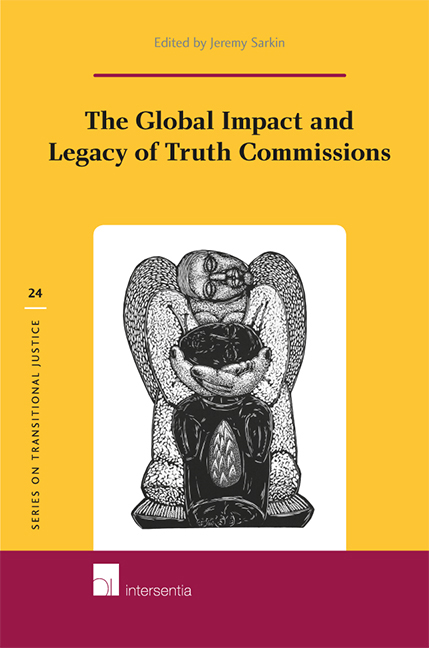Book contents
- Frontmatter
- Acknowledgements
- CONTENTS
- List of Contributors
- Introduction: Contextualising and Understanding the Global Role, Impact and Legacy of Truth Commissions
- Is Anyone Listening? A Review of the Research on Attitudes Towards Truth Commissions
- Assessing the Long-Term Impact and Legacy of Truth Commissions
- The Global Textual Legacies of Truth Commissions: Narratives on Sexual Violence in the Reports of Sierra Leone, Liberia, Kenya and Beyond
- The Implementation Record of Truth Commissions’ Recommendations in Latin America
- In the Aftermath of Truth: Implementing Truth Commissions’ Recommendations on Reparations – Following Through for Victims
- Truth Commissions and Social Justice: ‘Wishful Thinking or Not Very Thoughtful Wishing’?
- Transitioning Toward Dignity
- Towards an Understanding of How Truth Commissions Can Use Their Amnesty Powers to Enhance Their Impact and Legacy
- Truth Commissions in Non-Transitional Contexts: Implications for Their Impact and Legacy
- Surrogacy and Resistance: Evolving Patterns in Unofficial Truth Commissions and Truth Projects
- Index
Towards an Understanding of How Truth Commissions Can Use Their Amnesty Powers to Enhance Their Impact and Legacy
Published online by Cambridge University Press: 26 June 2019
- Frontmatter
- Acknowledgements
- CONTENTS
- List of Contributors
- Introduction: Contextualising and Understanding the Global Role, Impact and Legacy of Truth Commissions
- Is Anyone Listening? A Review of the Research on Attitudes Towards Truth Commissions
- Assessing the Long-Term Impact and Legacy of Truth Commissions
- The Global Textual Legacies of Truth Commissions: Narratives on Sexual Violence in the Reports of Sierra Leone, Liberia, Kenya and Beyond
- The Implementation Record of Truth Commissions’ Recommendations in Latin America
- In the Aftermath of Truth: Implementing Truth Commissions’ Recommendations on Reparations – Following Through for Victims
- Truth Commissions and Social Justice: ‘Wishful Thinking or Not Very Thoughtful Wishing’?
- Transitioning Toward Dignity
- Towards an Understanding of How Truth Commissions Can Use Their Amnesty Powers to Enhance Their Impact and Legacy
- Truth Commissions in Non-Transitional Contexts: Implications for Their Impact and Legacy
- Surrogacy and Resistance: Evolving Patterns in Unofficial Truth Commissions and Truth Projects
- Index
Summary
INTRODUCTION
Truth commissions play vital roles in a variety of societies seeking to deal with past violence. However, the extent or limitations of what that role is remains disputed. There has been a chorus of voices questioning the efficacy of these truth commissions in achieving their goals, and whether or not human rights issues in post-conflict societies have been resolved, or at least improved, by such processes. The frequency with which truth commissions are utilised, with over 50 cases (and possibly more than 100 if a wider definition of truth commission is used) taking place in such societies does seem to exemplify the fact that truth commissions do hold at least some value.
Borer claims that truth commissions have 25 or 26 distinct goals. Primary amongst these perceived goals, however, is that of truth-gathering, hence their name. Truth, as will be discussed, needs to be obtained from a variety of sources, including from perpetrators. Torne in this regard has argued that another function of truth commissions is to establish the identities of perpetrators. However, this is not always the case. Where truth commissions are intended to be the start of a process that later leads to prosecutions, they are sometimes prevented from disclosing names. In some of those cases, the truth commission also chooses to publish few, if any, names. Truth commissions do report in more general terms about institutional responsibility. They seek to clear the muddy waters of the past. They attempt to clarify the national narrative of such societies, and to establish a set of facts as a basis of the truth about the history and evolution of a given conflict, in order to devise a new and more acceptable national narrative. Whilst truth-gathering is unquestionably of great value and importance, the issue of accountability is more complex. The emergence of truth can open the door for accountability to come to the fore. However, many have argued that truth commissions in fact decrease the possibility of achieving accountability and justice in post-conflict societies. Thus, there is a view that truth commissions are, at times, replacements for retributive justice.
- Type
- Chapter
- Information
- The Global Impact and Legacy of Truth Commissions , pp. 211 - 246Publisher: IntersentiaPrint publication year: 2019
- 1
- Cited by



